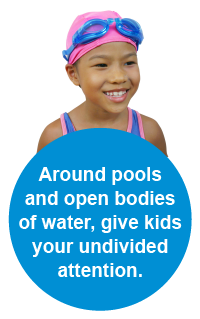 We know water is everywhere. So to make water safety easy, we divided it into three categories: Water safety at home, swimming safety and boating safety.
We know water is everywhere. So to make water safety easy, we divided it into three categories: Water safety at home, swimming safety and boating safety.
Here you'll find everything you need to know about swimming safety. Whether it's a trip to the beach or a dip in the community or backyard pool, you can ensure that swimming is as safe as it is fun by following a few basic safety tips.
The Hard Facts
Among preventable injuries, drowning is the leading cause of death for children 1 – 4 years old. Children 1 – 4 years old are more likely to drown in a pool. Children 5 years and older are more likely to drown in natural water, such as ponds, lakes and rivers.
Top Tips
- Watch kids when they are in or around water, without being distracted. Keep young children within arm’s reach of an adult. Make sure older children swim with a partner every time.
- Teach children how to swim. Every child is different, so enroll children in swim lessons when they are ready. Consider their age, development and how often they are around water.
- Make sure kids learn how to swim and develop these five water survival skills:
- Step or jump into water over their heads and return to the surface;
- Float or tread water for one minute;
- Turn around in a full circle and find an exit;
- Swim 25 yards to exit the water; and
- Exit the water. If in a pool, be able to exit without using the ladder.
- Teach children that swimming in open water is not the same as swimming in a pool. They need to be aware of uneven surfaces, river currents, ocean undertow and changing weather.
- Know what to do in an emergency. Learning CPR and basic water rescue skills may help you save a child’s life.
